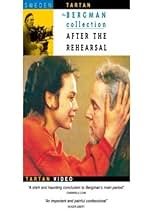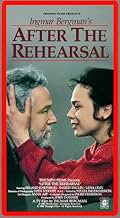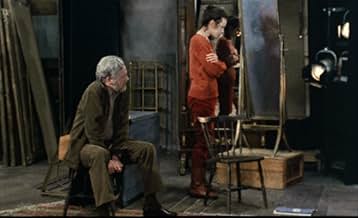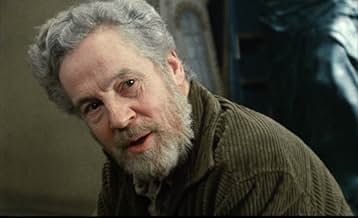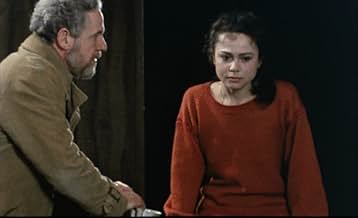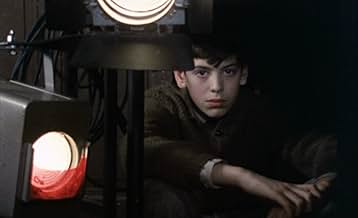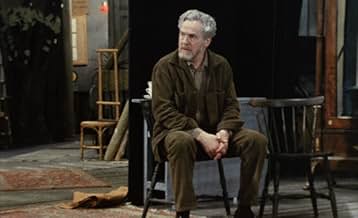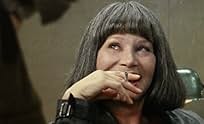NOTE IMDb
7,1/10
3,2 k
MA NOTE
Ajouter une intrigue dans votre langueAs an aging playwright interacts with the young lead in his play after everybody's gone home, he reminisces about her mother, whom he maintained a sexual relationship with before she died.As an aging playwright interacts with the young lead in his play after everybody's gone home, he reminisces about her mother, whom he maintained a sexual relationship with before she died.As an aging playwright interacts with the young lead in his play after everybody's gone home, he reminisces about her mother, whom he maintained a sexual relationship with before she died.
- Réalisation
- Scénario
- Casting principal
- Récompenses
- 2 nominations au total
Avis à la une
Here's a bit of an odd confession. I'm starting to like this Ingmar Bergman guy. Mind you, I've only seen two of his films (the other being Cries and Whispers) but he knows how to make a film, let me tell ya! After the Rehearsal is a great movie that makes you think, while marveling how clever the whole thing is. A theater director (played by Erland Josephson) is putting together a production called "The Dream Play". One of his actresses (Lena Olin) stays behind to talk to him about past experiences, his life and hers, and other existential topics. He does the same. A little while later an older actress comes on the scene, and essentially talks the same talk, only a little older but definitely not wiser. The interesting thing about this is, is that both women don't acknowledge the other.. So what's that about? Was this the same woman, only years later? Did these women exist at all, or are we indeed watching a "dream play" already? So many fascinating theories, I love it when a movie does that to me. The movie somewhat lags during the third act, but let me tell you, Bergman KNOWS how to end movies, like in Cries and Whispers and this one, it leaves some questions unanswered for us to figure out by ourselves, and Bergman seems to rejoice yanking us away from the story to go to the credits, which is great.
I want to see more! I will see more! Yay!
I want to see more! I will see more! Yay!
This is a brilliant work of art - it manages to be both an outstanding piece of theatre captured on film and an equally engaging film about theatre. There is no plot in a conventional sense, and absolutely no action. Instead, Erland Josephson, utterly convincing in his role as an aging theatre director, quietly and with ruthless honesty interacts with both his current new star and an actress from his personal and professional past. During this interplay, the director on the screen (speaking for the director behind the camera?) explains his love for actors and the theatre, while simultaneously modeling and undermining the sense of alienation that he feels he needs to have in order to get his job done in this world that he loves. At the same time, his young star examines her reasons for acting, and the woman from his past presents yet another take on the function of theatricality.
The dialogue is, as always with Bergman, perfect; the film is saturated with ideas; and the simple stage where every moment of the film takes place works in two directions at once, reminding us that we are watching a performance even while it insists we are also seeing "real" people at work.
Bergman is always amazing in his ability to express, in films that are set in singular specific locations, deep emotions and concepts that are nonetheless universal - in this film he gives us a little bonus, an insight into the motives behind manufacture of representation itself.
The dialogue is, as always with Bergman, perfect; the film is saturated with ideas; and the simple stage where every moment of the film takes place works in two directions at once, reminding us that we are watching a performance even while it insists we are also seeing "real" people at work.
Bergman is always amazing in his ability to express, in films that are set in singular specific locations, deep emotions and concepts that are nonetheless universal - in this film he gives us a little bonus, an insight into the motives behind manufacture of representation itself.
I may be biased though as I love and admire Ingmar Bergman. After The Rehearsal mayn't be among Bergman's very finest films, but it does deserve to be much more regarded as just a minor work. It could have done with being longer perhaps but all the things that make a Bergman film work are here. The cinematography from none other than Sven Nykvist is tight and helps to intensify After the Rehearsal's intriguing drama, while the setting looks beautiful yet realistic. Bergman as he always did directs with discipline, never once is there a sense that his heart was not in it. The scripting is intelligent and provokes a lot of thought, likewise the story is insightful in regard to art and emotion- I always admired how ambitious the themes in his films were- and almost autobiographical in structure. I have seen and heard people remark that they were indifferent to the characters, now the characters in Bergman's films are not always that likable but considering how realistically compelling they are(especially the women) you do get the sense that they weren't meant to be. Adding to this is how superbly acted After the Rehearsal is, you get that expectation seeing as we are talking about some of Sweden's finest ever actors and never here are you disappointed. All three leads, very hard to single out a standout, are really captivating and immerse themselves totally into the characters. All in all, very, very good. 9/10 Bethany Cox
10agboone7
I've always said that I could never choose a favorite filmmaker, but that if I had to, it would be Ingmar Bergman, for certain. A bit of a contradiction, I admit, but there you have it. For me, he is the grandmaster of the cinema. I've seen exactly forty of his films, and "After the Rehearsal" may be the greatest of them all.
Of course, that depends very much on your tastes. We see here a very different Bergman from the one many viewers are accustomed to. There are, after all, two Ingmar Bergmans: First, we have Bergman the magician, the cinematic sorcerer who made films like "The Seventh Seal" and "Persona". Secondly, we have Bergman the realist, emerging during the latter period of his career, with films like "Scenes From a Marriage" and "Autumn Sonata". These films aren't quite realism, of course — they're still very formal — but they're certainly very stripped-down and minimalistic by comparison.
"After the Rehearsal" is probably the most extreme example of this latter category of Bergman's cinema. It is a minimalist exercise in what is essentially filmed theater. As a result, those looking for the kind of cinematic wizardry that Bergman displayed in so many of his films up through the '60s (and which he revived for "Fanny and Alexander" in 1982) may be a bit disappointed by this film, strictly in aesthetic and stylistic terms. Nyqvist's cinematography is absolutely masterful, as always, but it's masterful in the same way it was in "Scenes From a Marriage" — unrelenting close-ups of the frail human condition, et cetera — versus the kind of technical and formal mastery he displayed in "Fanny and Alexander" or Tarkovsky's "The Sacrifice". This is a low-budget, theatrical production, so don't expect a grand tour de force of Bergmanian cinema.
On the other hand, when it comes to content, that's exactly what "After the Rehearsal" is. It offers the most insightful, profound exposition yet of Bergman's identity, essence, and point of view as an artist, as a filmmaker (and as a theater director), and perhaps most notably, as a human being. Every line, every word, every expression, every intonation, every gesture is a revelation of the most meaningful variety, for those who are familiar with Bergman and his way of expressing ideas. Never before has Bergman condensed so much thought, so many ideas and themes, into one film (and quite a short one at that). This is a concentrated exercise in subtextual expression, and on that note, I have two caveats to issue to those considering watching this film.
First, as we know, most audiences today don't like to be provoked toward thought, analysis, or self-reflection, so if you're turned off by the idea of watching two people talk for seventy minutes straight, save yourself the effort and skip this one. "After the Rehearsal", even more than normal for a Bergman film, requires the ability to think in thematic, subtextual, and metaphorical terms. Even for the most avid Bergman fans, and even by the strictest Bergman standards, this film requires patience and thorough analysis.
Secondly, I'm a firm believer in experiencing a filmmaker's body of work chronologically. I know many viewers don't share this compulsion, but I must stress that it is crucial for this film. "After the Rehearsal" is a deep and painstaking reflection on everything Bergman has ever done and everything he has ever been during the course of his long and illustrious career. If you haven't seen the vast majority of Bergman's previous work, this film will be impossible to fully appreciate.
Virtually all of Bergman's recurring themes are present in "After the Rehearsal", such as the idea of human beings as actors in this often shoddy, second-rate production that we call life. Bergman's characters engage in emotional dialogue or intensive introspection, and then, hearing the words come out of their mouths, they experience shame and mortification as a result of what they perceive to be their own playacting and histrionics, and so they subsequently backpedal over their previous statements with a tone of fatigue and despair. It's not just Bergman's characters, however, that exhibit this behavior. Bergman himself does it, from film to film. The first time we saw it was in "Prison" (1949), his sixth film, when he criticized himself in a moment of self-reference that cited a scene from "It Rains on Our Love" (I believe). Since then, and especially in his later work, it's been a constant for Bergman, although much more subtle and less explicit than it was in "Prison". In a way, it provides a metaphor for what Bergman does with "After the Rehearsal".
"Fanny and Alexander" is considered Bergman's swan song, and I suppose it is. He officially retired from cinema afterwards, and everything he directed since then, with the exception of "The Making of Fanny and Alexander", was a television film, including "After the Rehearsal", in which Bergman makes one last attempt to clarify himself, to backpedal on a career of directing films and plays, and to explain what it all meant, and what he has become in light of it.
"After the Rehearsal" is a highly self-reflexive, metatextual meditation on what it means to be a director. The power, the manipulation, the messy emotions and relationships with actors who often confuse the role they play in a film (or play) with the role they play in life. The two roles begin to converge, and at the helm of it all, there is Bergman, a man who is slowly but surely distancing himself from the world around him. The world of cinema. The world of theater. The world of life.
Ultimately, that's what "After the Rehearsal" is about. It's Bergman's explanation and exploration of the reasons why he has chosen to distance himself from the world of filmmaking, and it's brilliant for every moment of its 72 minutes.
RATING: 9.67 out of 10 stars
Of course, that depends very much on your tastes. We see here a very different Bergman from the one many viewers are accustomed to. There are, after all, two Ingmar Bergmans: First, we have Bergman the magician, the cinematic sorcerer who made films like "The Seventh Seal" and "Persona". Secondly, we have Bergman the realist, emerging during the latter period of his career, with films like "Scenes From a Marriage" and "Autumn Sonata". These films aren't quite realism, of course — they're still very formal — but they're certainly very stripped-down and minimalistic by comparison.
"After the Rehearsal" is probably the most extreme example of this latter category of Bergman's cinema. It is a minimalist exercise in what is essentially filmed theater. As a result, those looking for the kind of cinematic wizardry that Bergman displayed in so many of his films up through the '60s (and which he revived for "Fanny and Alexander" in 1982) may be a bit disappointed by this film, strictly in aesthetic and stylistic terms. Nyqvist's cinematography is absolutely masterful, as always, but it's masterful in the same way it was in "Scenes From a Marriage" — unrelenting close-ups of the frail human condition, et cetera — versus the kind of technical and formal mastery he displayed in "Fanny and Alexander" or Tarkovsky's "The Sacrifice". This is a low-budget, theatrical production, so don't expect a grand tour de force of Bergmanian cinema.
On the other hand, when it comes to content, that's exactly what "After the Rehearsal" is. It offers the most insightful, profound exposition yet of Bergman's identity, essence, and point of view as an artist, as a filmmaker (and as a theater director), and perhaps most notably, as a human being. Every line, every word, every expression, every intonation, every gesture is a revelation of the most meaningful variety, for those who are familiar with Bergman and his way of expressing ideas. Never before has Bergman condensed so much thought, so many ideas and themes, into one film (and quite a short one at that). This is a concentrated exercise in subtextual expression, and on that note, I have two caveats to issue to those considering watching this film.
First, as we know, most audiences today don't like to be provoked toward thought, analysis, or self-reflection, so if you're turned off by the idea of watching two people talk for seventy minutes straight, save yourself the effort and skip this one. "After the Rehearsal", even more than normal for a Bergman film, requires the ability to think in thematic, subtextual, and metaphorical terms. Even for the most avid Bergman fans, and even by the strictest Bergman standards, this film requires patience and thorough analysis.
Secondly, I'm a firm believer in experiencing a filmmaker's body of work chronologically. I know many viewers don't share this compulsion, but I must stress that it is crucial for this film. "After the Rehearsal" is a deep and painstaking reflection on everything Bergman has ever done and everything he has ever been during the course of his long and illustrious career. If you haven't seen the vast majority of Bergman's previous work, this film will be impossible to fully appreciate.
Virtually all of Bergman's recurring themes are present in "After the Rehearsal", such as the idea of human beings as actors in this often shoddy, second-rate production that we call life. Bergman's characters engage in emotional dialogue or intensive introspection, and then, hearing the words come out of their mouths, they experience shame and mortification as a result of what they perceive to be their own playacting and histrionics, and so they subsequently backpedal over their previous statements with a tone of fatigue and despair. It's not just Bergman's characters, however, that exhibit this behavior. Bergman himself does it, from film to film. The first time we saw it was in "Prison" (1949), his sixth film, when he criticized himself in a moment of self-reference that cited a scene from "It Rains on Our Love" (I believe). Since then, and especially in his later work, it's been a constant for Bergman, although much more subtle and less explicit than it was in "Prison". In a way, it provides a metaphor for what Bergman does with "After the Rehearsal".
"Fanny and Alexander" is considered Bergman's swan song, and I suppose it is. He officially retired from cinema afterwards, and everything he directed since then, with the exception of "The Making of Fanny and Alexander", was a television film, including "After the Rehearsal", in which Bergman makes one last attempt to clarify himself, to backpedal on a career of directing films and plays, and to explain what it all meant, and what he has become in light of it.
"After the Rehearsal" is a highly self-reflexive, metatextual meditation on what it means to be a director. The power, the manipulation, the messy emotions and relationships with actors who often confuse the role they play in a film (or play) with the role they play in life. The two roles begin to converge, and at the helm of it all, there is Bergman, a man who is slowly but surely distancing himself from the world around him. The world of cinema. The world of theater. The world of life.
Ultimately, that's what "After the Rehearsal" is about. It's Bergman's explanation and exploration of the reasons why he has chosen to distance himself from the world of filmmaking, and it's brilliant for every moment of its 72 minutes.
RATING: 9.67 out of 10 stars
Essentially a playwright, adapted for the cinema, first as a screenwriter and then combining this role with that of director, Ingmar Bergman left an impressive cinematographic work but even more extensive in the theater, whether writing, adapting and directing other people's plays.
In the final phase of his career, he dedicated himself mainly to the theater and the few films he made, after the biopic that was Fanny & Alexander in 1982, were mere adaptations for the cinema or television of theater plays.
This is undoubtedly the case of this "After the Rehearsal" from 1984, which has only three characters and was filmed entirely on a stage, with a single set.
In retrospect, and considering everything that has been written and debated about Bergman since his death, particularly with regard to his relationship with the many actresses he worked with, one would say that this film is clearly autobiographical and reveals the author's sadness in dealing with old age, particularly with regard to his relationship with actresses, who continue to tempt him and seduce him, but to whom he no longer has anything to offer, other than his experience and his ability to make them blossom on stage or on screen.
A feeling shared by most men over fifty, especially those accustomed to a hectic love life, like Bergman, who was married five times and had nine children from five different women, including wives and more informal relationships.
The work is insightful and intelligent, as it could not be otherwise, with Bergman as the author, and the actors are the usual Erland Josephson and Ingrid Thulin, always magnificent, joined by a younger Lena Olin, who had already played supporting roles with Bergman since 1976, but makes her debut here, with a leading role, which would open doors for her future international career.
This is Bergman at his best, but in a static, theatrical, not very cinematic format. It is worth it for the script and performances, but as a film, it feels like too little. After all, is cinema just filmed theater, as Manoel de Oliveira believed?
In the final phase of his career, he dedicated himself mainly to the theater and the few films he made, after the biopic that was Fanny & Alexander in 1982, were mere adaptations for the cinema or television of theater plays.
This is undoubtedly the case of this "After the Rehearsal" from 1984, which has only three characters and was filmed entirely on a stage, with a single set.
In retrospect, and considering everything that has been written and debated about Bergman since his death, particularly with regard to his relationship with the many actresses he worked with, one would say that this film is clearly autobiographical and reveals the author's sadness in dealing with old age, particularly with regard to his relationship with actresses, who continue to tempt him and seduce him, but to whom he no longer has anything to offer, other than his experience and his ability to make them blossom on stage or on screen.
A feeling shared by most men over fifty, especially those accustomed to a hectic love life, like Bergman, who was married five times and had nine children from five different women, including wives and more informal relationships.
The work is insightful and intelligent, as it could not be otherwise, with Bergman as the author, and the actors are the usual Erland Josephson and Ingrid Thulin, always magnificent, joined by a younger Lena Olin, who had already played supporting roles with Bergman since 1976, but makes her debut here, with a leading role, which would open doors for her future international career.
This is Bergman at his best, but in a static, theatrical, not very cinematic format. It is worth it for the script and performances, but as a film, it feels like too little. After all, is cinema just filmed theater, as Manoel de Oliveira believed?
Le saviez-vous
- AnecdotesIngmar Bergman was so impressed when he met Lena Olin for the first time that he wrote the part of Anna especially for her.
Meilleurs choix
Connectez-vous pour évaluer et suivre la liste de favoris afin de recevoir des recommandations personnalisées
Détails
Box-office
- Montant brut mondial
- 942 $US
Contribuer à cette page
Suggérer une modification ou ajouter du contenu manquant

